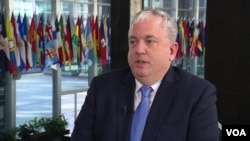The United States has invited all members of the Asia-Pacific Economic Cooperation (APEC) to participate in upcoming leaders’ meetings in California, but “appropriate representation” for certain leaders who are under U.S. sanctions is being worked out, according to a senior State Department official.
Matt Murray, U.S. senior official for APEC, spoke Monday to VOA State Department bureau chief Nike Ching to preview APEC summit meetings that will begin in mid- November in San Francisco.
Twenty-one economies from APEC will discuss a host of issues that include energy security, sustainable agricultural food, women’s economic empowerment and health.
Russian President Vladimir Putin has been sanctioned by the United States since Feb. 25, 2022, for Russia’s invasion of Ukraine. In March, the International Criminal Court issued an arrest warrant for Putin. While the U.S. does not recognize the court, U.S. President Joe Biden welcomed ICC’s decision and said the move is justified because Putin “clearly committed war crimes.”
During an address in June 2022 at the annual St. Petersburg International Economic Forum, Putin lashed out at the U.S., asserting that Russia is strong and warning that Western sanctions will rebound.
John Lee became Hong Kong's chief executive on July 1, 2022. He has been sanctioned by the U.S. Treasury since 2020 for what the U.S. says is his role in undermining Hong Kong’s autonomy.
Lee has laughed off U.S. sanctions, stating that they have no legal basis in Hong Kong.
Murray said the Biden administration will abide by U.S. “laws and regulations” when asked if the U.S. is inviting Putin and Lee to attend APEC leaders’ meetings.
The U.S. official on APEC also said Washington and Beijing are “working towards” a face-to-face meeting between Biden and Chinese President Xi Jinping on the margins of APEC, but details are still being worked on.
This interview has been edited for brevity and clarity.
VOA: What makes this year's summit significant?
MATT MURRAY, U.S. SENIOR OFFICIAL FOR APEC: APEC is an organization with 21 member economies that make up half of global trade, and 60% of global GDP. And APEC has long been an organization that's consensus-based, nonbinding and an incubator for good ideas on the economic policy front. Our theme for this year is Creating a Resilient and Sustainable Future for All, as we seek to advance an interconnected, innovative and inclusive Asia-Pacific region.
VOA: Is there concern that Israel's war with Hamas will overshadow APEC?
MURRAY: Certainly, some of the challenges that we face, such as in the situation in Israel with Hamas, could be an area of discussion. But I wouldn't say that the situation in the Middle East would overshadow what is happening at APEC.
VOA: Nationals from APEC members are among the hostages held by Hamas. For example, dozens of Thai citizens are being held. Can the U.S. help?
MURRAY: There has been a lot of coordination, collaboration, working diplomatic channels around the world with all of our partners to do whatever we can to free the hostages that are in the Middle East. If there's anything that can happen during the APEC meetings to address that situation, then certainly would be a great outcome.
VOA: Has the U.S. sent out the invitations to all the APEC leaders? Who will represent Russia, China and Hong Kong?
MURRAY: We've invited all APEC members to participate in San Francisco at the leaders’ week. We want to not only host the meetings within the spirit and principles of APEC but also within the laws and regulations of the United States.
There are a couple of cases where APEC leaders have been sanctioned here in the United States. And so, we have to work through those situations to make sure that they have appropriate representation in San Francisco.
VOA: Can you talk about the highly watched potential meeting between President Joe Biden and Chinese President Xi Jinping on the margins of APEC? Is it conducive to stabilizing the bilateral relationship?
MURRAY: In terms of the U.S.-China relationship, we want to keep open channels of communication, and we want to be able to manage competition responsibly. We are working towards a meeting in San Francisco between President Xi Jinping and President Biden, but a lot of details are still being worked on.
VOA: On artificial intelligence: Is there a diplomatic push to have a joint statement to establish guidelines to ensure the “safety, security and trust” as an international standard when using AI?
MURRAY: Certainly, artificial intelligence is one of the key issues, emerging issues, under the digital economy focus. I can't say that we will have something in the leaders’ statement at this point, but clearly, anything that we can do in APEC to bring together these 21 economies and talk about what a shared future looks like with respect to digital issues, we certainly want to be able to do that.




